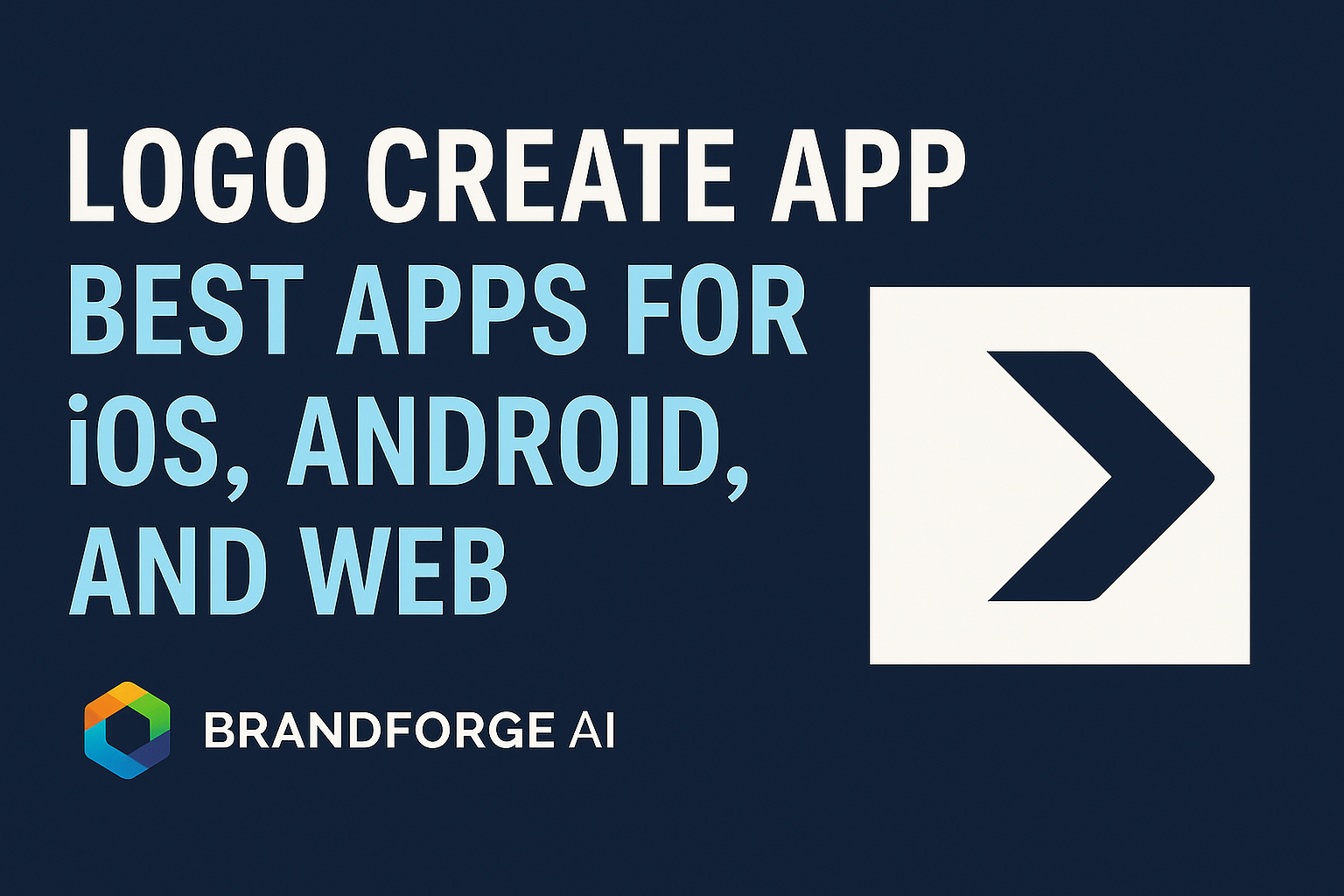Logo Create App: Best Apps for iOS, Android, and Web
September 25, 2025 by Aarav Sharma

Choosing a “logo create app” isn’t just about templates. You need clean exports (PNG/SVG), sensible licensing, and a workflow that lets you iterate quickly—ideally with AI to explore directions and then refine.
This guide compares the top apps across iOS, Android, and web so you can ship a crisp, on-brand logo today.
TL;DR
- Best mobile-first: Canva (iOS/Android) — huge asset library, quick edits, easy PNG. SVG requires Pro.
- Best vector on iPad: Linearity Curve (formerly Vectornator) — true vector control, exports SVG.
- Best AI-guided web flow: BrandForge AI — brand-aligned prompts, fast iterations, export kit.
- Best free vector desktop: Inkscape — fully free, pro-level vectors; manual but powerful.
Prefer AI-guided concepting? Read: Can ChatGPT Create a Logo? and AI Logo Design: From Idea to Icon.
What matters in a logo app
- Exports: Transparent PNG at minimum, SVG for scalability.
- Licensing: Clear rules for commercial use and any attribution.
- Uniqueness: Avoid overused templates; aim for simple, ownable shapes.
- Iteration speed: Quick edits, styles, and one-change-at-a-time refinement.
- Brand system: Colors, typography, spacing, and a reusable kit.
Top apps and tools (mobile + web + desktop)
1) Canva (iOS, Android, Web)
- Pros: Massive template and icon library; quick layout tools; transparent PNG.
- Cons: SVG export requires Pro; templated outputs can look similar.
- Best for: Fast DIY logos and social assets.
2) Adobe Express (iOS, Android, Web)
- Pros: Polished templates; integrates with Adobe ecosystem; font variety.
- Cons: Some assets behind paywall; watch for watermark rules on free plan.
- Best for: Clean, guided creation within Adobe’s ecosystem.
3) Linearity Curve / Vectornator (iPad, macOS)
- Pros: True vector drawing; pen, shape, and boolean tools; exports SVG/PDF.
- Cons: Learning curve vs “logo maker” apps; manual design work.
- Best for: Precision vectors on iPad; designer-like control.
4) Logo Maker Shop (iOS)
- Pros: Quick presets and symbols; simple typography controls.
- Cons: Limited uniqueness; some assets paid; SVG support varies.
- Best for: Quick iPhone/iPad logo drafts.
5) Logo Maker Plus (Android)
- Pros: Lots of icons and fonts; very quick composition.
- Cons: Exports and licenses vary; beware lookalikes.
- Best for: Rapid Android-first mockups.
6) Figma (iOS companion, Desktop/Web)
- Pros: Vector tools, constraints, plugins; team collaboration; exports SVG/PNG.
- Cons: Not a generator; requires design know-how.
- Best for: Teams and precise vector editing; building a basic brand system.
7) Inkscape (Desktop, Free)
- Pros: Full vector editor; professional path tools; SVG native.
- Cons: No templates by default; steeper learning curve.
- Best for: Free, pro-level vector work from scratch.
8) Affinity Designer (iPad, Desktop)
- Pros: One-time purchase; powerful vector tools; export SVG, PDF, EPS.
- Cons: No built-in “logo maker” templates; manual process.
- Best for: Designers who want ownership without subscriptions.
9) Hatchful by Shopify (Web)
- Pros: Easy questionnaire and quick generation; free downloads.
- Cons: Limited editing; generic templates.
- Best for: Simple logos to get started quickly.
10) BrandForge AI (Web)
- Pros: AI-guided concepting from your brand profile; Refinement Studio for iterative changes; export assets.
- Cons: Full brand kits on paid plans.
- Best for: Rapid, brand-aligned AI exploration with clean exports.
11) Namecheap Logo Maker (Web)
- Pros: Free download and simple license for many uses.
- Cons: Editing depth is limited; outputs can be common.
- Best for: No-strings, simple exports.
12) Adobe Illustrator (Desktop, iPad)
- Pros: Industry standard for vectors; perfect curves and precise control.
- Cons: Subscription; steeper learning curve.
- Best for: Production-grade identity and hand-tuned vectors.
Recommended workflows
-
AI-first concepting, then vector polish
- Use an AI tool (e.g., BrandForge AI) to generate 3–5 directions.
- Pick the strongest idea; bring it into a vector editor (Figma, Linearity Curve, Illustrator).
- Simplify paths, adjust proportions, and finalize spacing/kerning.
- Export SVG + PNG and test at small sizes.
-
Mobile-first creation
- Draft in Canva on iOS/Android; keep shapes simple and bold.
- Export PNG; if you need SVG, upgrade or re-create vectors in Figma/Linearity Curve.
- Build a mini brand kit (colors, fonts, spacing) for consistency.
Make your app-made logo look pro
- Use a simple, ownable silhouette; avoid complex details.
- Test at 24–48px and in monochrome for clarity.
- Align to a grid; keep optical balance (counterspace, symmetry).
- Limit to 1 icon + 1 typeface; manage letter spacing carefully.
- Export: SVG (primary), PNG 512–1024px (web), PDF (print).
FAQ
Q: Which app is best for free SVG export? A: Linearity Curve and Inkscape export SVG free. Canva’s SVG needs Pro.
Q: What about licensing for commercial use? A: Check each app’s asset and template license. Many allow commercial use, but icon libraries/fonts may differ.
Q: How do I ensure uniqueness if I use templates? A: Start from a template but simplify, redraw, or refine in a vector editor. Keep shapes minimal and distinct.
Q: Can ChatGPT help me design a logo in these apps? A: Yes—use it for a brand brief, style directions, and iterative prompts. See: Can ChatGPT Create a Logo?
Related reading
- Where to Create a Logo for Free: 12 Tools Compared — /blog/where-to-create-a-logo-for-free
- Can ChatGPT Create a Logo? — /blog/can-chatgpt-create-a-logo
- AI Logo Design: From Idea to Icon — /blog/ai-logo-design-from-idea-to-icon
Ready to turn your concept into a polished mark? Try the Logo Generator and Refinement Studio in BrandForge AI. Create a Logo now.